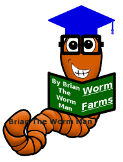Hi everybody 😀
Today in the blog I’m talking about composting worm Genus & SPECIES versus common names.
What’s in a name anyway?
The problem with common names is that they can change from location to location. They can also be changed or created by people who want to set their worms apart – make them special as it were.
Whereas when you talk in scientific terms – the genus and species of worms cannot be changed and is the same the world over.
“So What IS A Tiger worm” you may ask 🙂
“Tiger Worms” is a common name, the same as “red worms” or “red wigglers” is a common name – as is “blue worms”.
Tiger worms and red wigglers sometimes refers to the same species – the Eisinea fetida/Eisinea andrei worm – other common names for these are manure worm and brandling worm.
For some people red worm can actually mean the Lumbricus rubellus – which is one of the worms that’s actually halfway between a composting worm and a soil dweller.
Some people say worms that have no “banding/striping” are red worms, and those that are banded/striped are the tigers.
Suffice to say that it is most likely that we are all talking about the same worms, by different names.
So WHAT is GENUS and SPECIES – and how are they written and used?
Then if we want to get deeper into it, there are two different species – of the same genus – that we generally refer to as red wigglers/red worms/tiger worms. (I am leaving out the L. rubellus here)
They are of the same GENUS – “Eisinea” – but different SPECIES – or cousins if you like – fetida and andrei.
Only a scientific dissection can show the identity between these two.
The GENUS is capitalized; while the SPECIES is not – eg Eisinea fetida.
How are these names used and shortened?
When we already know, for instance, that we are talking about the Eisinea GENUS – that can be shortened to the first letter, followed by a full stop; then the SPECIES is written.
Example – “Eisinea fetida and E. andrei are commonly called red wigglers.”
If we refer to both Eisinea species it can also be written as, for example “The Eisinea spp. are commonly called red wigglers” – in this case the “spp” means multiple species.
If we wrote “The Eisinea sp. make good composting worms” – we are referring to only the one species.
In professional documentation you may also see the scientific names of animals and plants ITALICIZED.
Other worms in common use:
Blue Worms:
Commonly used as composting worms are also the “blue worm” – in the USA this is the Perionyx excavatus – in Australia we have it’s “cousin” the P. spenseralia.
Composting species which are also grown for bait: (but sometimes used to create compost too)
Two of the worms commonly grown for bait are actually composting worms too. These are the:
African Night Crawler – Eudrilus euginae
European Night Crawler – Eisinea hortensis (another cousin of the reds 😉 )
Earthworms – also known as soil dwellers
Some worms, by their nature, are not suited to a small composting farms.
Some of these are what Americans and Canadians call “night crawlers” – but are the soil dweller Lumbricus terrestris.
So . . . what’s in a name? A lot, depending on how you use it 🙂
Thanks for reading my blog
Regards,
Brian.
Get This Now
It's FREE
For Subscribers
You can subscribe to my blog at:
https://thewormman.com.au/subscribe-to-the-worm-man/
For Further Worm Farming Info:
I have that FREE FAQ Guide – you can download it at:
Remember – you can also “Ask Brian A Question” on my website at:
https://thewormman.com.au/ask-a-worm-question/
You can investigate the questions that have already been asked and answered at:
https://thewormman.com.au/worm-questions/
If you want to get SERIOUS about Worm Farming – OR thinking of starting a worm business?
Do you want to produce a LOT of VC – getting more SERIOUS about worm farming?
Maybe you’ve thought about getting into business with worms?
I REALLY advise you to go check out the Worm Farming Alliance.
There you can get all the mentoring, training and information that you need. Check it out here:

